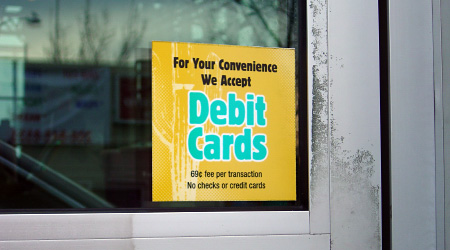What Is A Debit Card?

A debit card, sometimes referred to as a check card, allows consumers to access funds in a checking account without having to use cash or write a check. For many consumers who are unable to qualify for a traditional credit card, a debit card offers increased flexibility when making payment without having to meet the stringent employment and income requirements. For daily purchases like groceries and gasoline, debit cards really are the best of both worlds by offering additional payment options without the fear of acquiring excess debt.
Debit cards or often considered a hybrid payment tool because it is accepted like credit card at traditional and online retailers without the need to make a monthly credit card payment. By being tied directly to a consumer checking account, shoppers no longer need to withdraw cash prior to an outing or inconvenience others waiting in line behind them when writing a check. Retailers like debit cards because it means increased payment options for consumers which will hopefully lead to more sales.
Debit cards incorporate the use of a Personal Identification Number (PIN) to allow consumers to make purchases a retail establishments. When purchasing a product or paying for a service, many consumers will request additional cash back on top of the purchase amount obviating the need to visit an ATM to withdraw funds. Debit cards are supported by the same networks which process credit card payments which means they are accepted anywhere Visa and MasterCard branded credit cards would normally be used for payment. This means that debit cards can be used at over 15 million merchants from around the world.
There are a few negatives when using debit cards which consumers should be aware of to avoid unpleasant surprises. Some financial institutions will charge fees for debit card purchases either on a per transaction basis or for monthly maintenance. It is also possible for a debit card to fall into the wrong hands leading to a complete emptying of the associated bank account. Since it is not a credit card it is not offered the same fraud protections like notification by the lender or a maximum liability of $50. More often than not, debit card fraud is not detected until a monthly bank statement is received and balanced showing the discrepancy. Fortunately, with ubiquitous online banking access consumers are better able to protect themselves and their money with vigilant monitoring.
Debit cards also do not offer the same credit repair or credit building possibilities as more traditional credit cards. A credit card is a revolving line of credit account which requires monthly payments, balance management and approval for transactions. Its use provides insight into financial management, decision-making and overall judgment. With debit cards, you either have the money immediately available or you don't. For example, if a debit card is used when renting a vehicle it will be treated as if the consumer is using cash or a check and payment may be required in full and up front.
Regardless of the drawbacks when using debit cards, their convenience means that their popularity has only increased over the years. Approximately 60 million consumers currently use debit cards and it is common practice for most banks and credit unions to issue a debit card with each new checking account. Debit cards are just one more tool available to consumers and if used responsibility they can provide an exceptional level of convenience.







